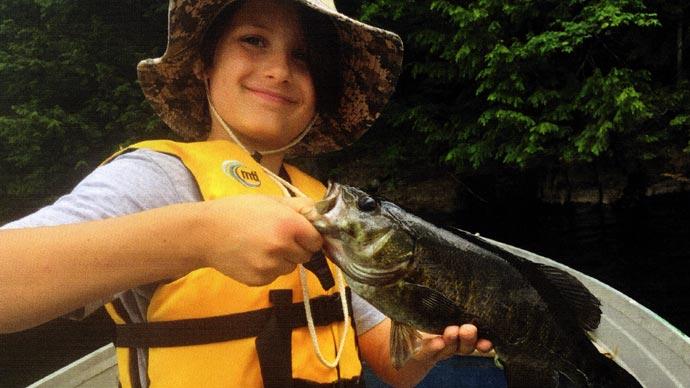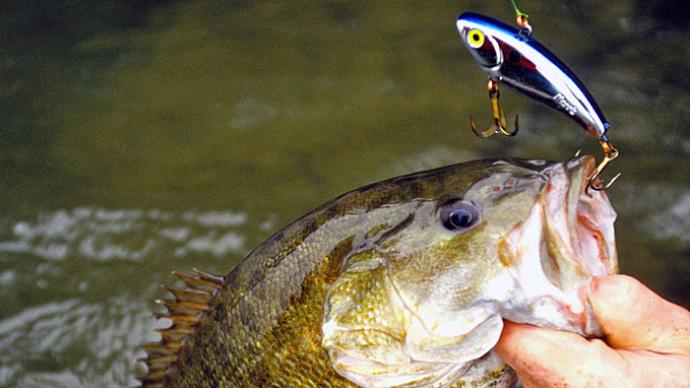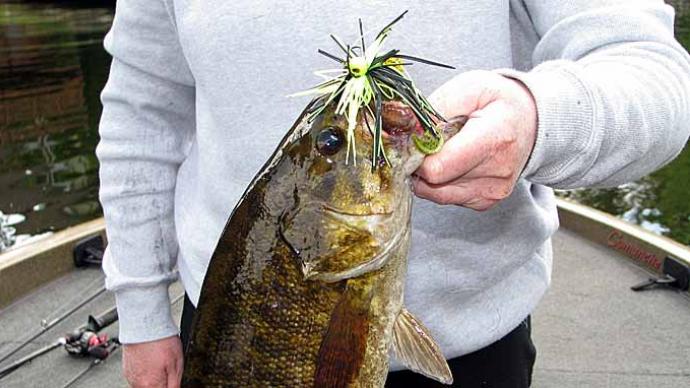
Who is that fish? Sometimes it's hard to tell. They can sometimes act, very much like a Brown Trout. Then it seems sometimes as if they think they are a largemouth bass. Not a warm water fish, still not a cold-water fish, but rather right in between. What we here in Maine call a cool water fish, but I'm not sure I have heard that description anywhere else.
To me, at least, one of the fascinating things about our beloved Bronze is its marvelous adaptability. They may turn up almost anywhere in this great country of ours and that of our neighbors to the North, several of the Canadian Provinces. From Nova Scotia to California, from Washington State to Georgia, the only two states to my knowledge where they are absent are Florida and Alaska. If someone were to write in and tell me they were there, I wouldn't be surprised.
Arguments have raged long and hard on the BassResource forums about how best they can be caught. That's arguing about the wrong thing. They can be caught in just about any way a person can think of to catch freshwater gamefish. I suspect it's harder to find a proven fishing technique that won't catch them. Yet here in Maine, I'm not sure everyone considers them a gamefish.
I have read that in the sporting press to be consistently successful at smallmouth fishing, it would be best if you downsized your lures. I guess that in some places, that may be true. But have found it much more likely that downsizing is more likely to downsize the fish you manage to catch. I have read that they are more easily caught on the bottom and then, in other articles, on the top. Either may be true. You can't prove it by me. We catch them here in Maine on the top, on the bottom, in between, on large lures, on small lures, or middle-sized lures, and just about any other way you may imagine. If you can find them, they can usually be caught.
My outlook is just a bit different from that of most folks. I'm a working guide, a commercial fisherman but not one who kills his catch. Most of my clients would soon throw me out of the boat to kill a good smallmouth. The other side is that day after day, year after year, they expect me to put them on fish. Lots of fish. Some big fish. I work with the smartest smallmouth in the world. They're so bright they even make an old guide like me look like he knows what he is doing more often than not.
I have to tell you that there is no intelligent smallmouth. Now I know that when you are butt-deep in almost freezing water with not a fish caught for your efforts, it's tough to believe that these fish aren't more intelligent than you are. Look at it logically: you will get out of the water and warm up. They aren't. Therefore you must be more imaginative.
This points out many of the differences between you and the smallmouth. You can look ahead. They don't. You can reason why you didn't use it to stay out of that ice water in the first place. I don't know, but you had that choice, and they didn't. Choice, reason, logic, the ability to use tools, including boats to keep your butt out of ice water, are all human traits and abilities. The only things that they have working for them are their instincts. But, and never lose sight of this fact, the larger fish we are most interested in have the most finely tuned instincts among their species. If they had turned them off, even for an instant, they probably would have never gotten large enough to interest you and me.
Now we come to a "new" factor, the adaptability of these beautiful fish. I always understood they were adaptable, but before the Internet came into being and I finally got smart enough to use it, I never realized how adaptable they are. There must be a basic model of smallmouth bass somewhere on this continent. I don't know where that would be, but it must be there. The people fishing for that one are to be envied. The rest of us have to learn all the tricks of that basic fish, plus all the adaptations that the basic model has made to thrive in the environment we have put them in. Now I suspect this base model was designed to live and thrive in a habitat like the Great Lakes before any dams with large bodies of water that had some flow in them.
Fishing for smallmouth today is kind of like buying a new truck. By the time all the options are added, the price has doubled, and the finished model only slightly resembles the base model. In honesty, anyone fishing for Smallmouth in one part of the country can fish with the same methods most anywhere with a good chance of success. The most significant difference I see is between a lake environment and that of a river. I guide regularly on two rivers and South Branch Lake, all above Bangor, Maine, during the spawn. I find it easier to locate fish on the rivers than on a lake once the spawn is over.
To me, at least, current flows and current breaks are the keys to river smallies. The fishing press frequently talks about rocks. Most of these folks, who are writing, don't even know what rocks are. Come on up here, and I'll show you some Penobscot pebbles. We have rocks, and many of them only rarely hold fish. This could be because there are just not enough fish to go around, but many of us would find that hard to believe. I don't think the rocks are the key, but rather the current breaks around the rocks are.
So, what do we have so far? One fish with constantly changing habitat, climate, the weather within the climate, and differing food bases. I would guess several distinctive strains of bass to be dealing with. Other than the same basic fish, I view these other things as "behavior modifiers." These things alter basic smallmouth behavior, and we seem to have better success when we fine-tune our fishing to make some allowances for this.
A couple of weeks ago, we caught several smallmouths out of Lake Powel on the Arizona-Utah border. When you held them up and looked closely at them, you could see no apparent difference in appearance from the fish we caught all summer in Maine's Penobscot River. They looked the same, fought the same, felt the same to my touch, but they had to be different. I am used to catching fish that see water only 20 to 25 feet deep throughout their lives. These fish came out of the water with depths up to several hundred feet deep. Now I'm not saying they were caught out of water that deep, but it was available to them, and I'm sure they utilize water there that is far deeper than anything my river fish have ever been exposed to. The forage base is different from the water depths, and the fish have adapted to that environment.
I suspect that we will be discussing this adaptability at greater length down the line. After all, it is one thing that makes our smallmouth the beautiful fish they are.



